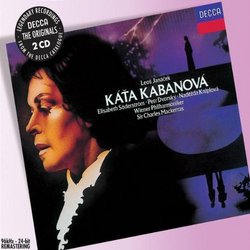| All Artists: Leos Janacek, Charles Mackerras, David Atherton, London Sinfonietta, Vienna Philharmonic Orchestra, Paul Crossley, Adolf Tomaschek, Dalibor Jedlicka, Elisabeth Söderström, Gertrude Jahn, Hedwig Drechsler, Jaroslav Soucek, Jitka Pavlova, Libuse Marova, Nadezda Kniplova, Peter Dvorsky, Vladimir Krejcik, Zdenek Svehla Title: Janácek: Káta Kabanová Members Wishing: 0 Total Copies: 0 Label: Decca Original Release Date: 1/1/2006 Re-Release Date: 6/13/2006 Album Type: Original recording remastered Genre: Classical Styles: Opera & Classical Vocal, Chamber Music, Forms & Genres, Concertos, Instruments, Keyboard Number of Discs: 2 SwapaCD Credits: 2 UPC: 028947575184 |
Search - Leos Janacek, Charles Mackerras, David Atherton :: Janácek: Káta Kabanová
 | Leos Janacek, Charles Mackerras, David Atherton Janácek: Káta Kabanová Genre: Classical
|
Larger Image |
CD Details |
CD ReviewsOne of the great Twentieth Century operas in its best produc Christopher McKoy | La Canada Flintridge, CA United States | 11/30/2006 (5 out of 5 stars) "This is a very welcome digitally remastered release of Charles Mackerras' classic recording of Janacek's operatic masterpiece Kat'a Kabanova. If you have never heard a Janacek opera, Kat'a Kabanova will be unlike any you've experienced. Moreover, if you believed until now that Richard Strauss and Puccini have a monopoly on the expression of intense passion in Twentieth Century opera, Janacek will surely change your opinion. With the possible exception of the final 10 minutes of Janacek's 'The Makropulos Case,' Kat'a Kabanova features the most passionate music Janacek ever wrote. But this is not to say that his is the 'lush-romantic' musical passion to which fans of Nineteenth Century opera are accustommed (e.g., Massenet's music). Janacek's is the expression in music of intense, sometimes even painful, longing (one Janacek scholar refers to his music as the ultimate in 'musical expressionism') -- an accomplishment all the more remarkable in view of the fact that Janacek is almost completely devoid of Wagner's influence. In Kat'a Kabanova, Janacek assaults the listener with the kind of unremitting tension achieved by Wagner in Tristan but through the employment of his own unique musical idiom, which also has little in common with the Czech musical tradition of Dvorak and Smetana. In this respect Janacek is, like Mussorgsky, sui generis; his style is all his own. Of very few composers can this be said.
In my view, Kat'a Kabanova is Janacek's masterpiece. Kabanova is the first of Janacek's last four operas and is (musically) considerably more accessible than the final two, 'The Makropulos Case' and 'From The House of the Dead' -- though if you find yourself attracted to Kabanova, you will surely want to explore all of Janacek's operatic work. (In particular, 'From the House of the Dead,' based on Dostoevsky's memoirs from his time in a Siberian labor camp, is a masterpiece of operatic realism -- it is surely one of the most grim operas ever written, even moreso than Berg's Wozzeck.) The plot of Kat'a Kabanova, which is considerably more conventional than Janacek's other librettos (e.g., his next opera, The Cunning Little Vixen, features a cast comprised mostly of animals!), is based on the novel 'The Storm' by the Russian writer Victor Ostrovsky, and revolves around a woman (Kat'a) who is painfully trapped in a loveless marriage. While her husband is away, she has an affair that eventually leads to her suicide from despair and guilt. The final scene featuring a long 'aria' by Kat'a (Janacek didn't generally include true arias in his operas after his third opera, Jenufa) in which she expresses her feelings, among other things, about her own impending suicide, is utterly captivating. There is a more recent recording of Kabanova that is also conducted by Charles Mackerras (who almost single-handedly rescued Janacek's operas from undeserved obscurity), but the singing is not quite up to Soderstrom's and Dvorsky's in Mackerras' earlier recording of the opera, which was the first of what became his 'cycle' of Janacek operas for Decca. Let me conclude by saying that if you are looking for a new and dramatic direction in your opera listening, Janacek may well be your man. If you've had enough of Wagner's (and Strauss's) 'endless melody' and have grown tired of the pretty arias and big choruses of the Italians, give Kat'a Kabanova a try -- you won't be disappointed." |

 Track Listings (19) - Disc #1
Track Listings (19) - Disc #1